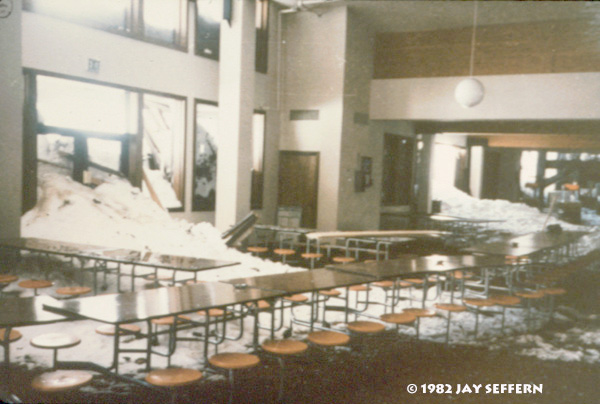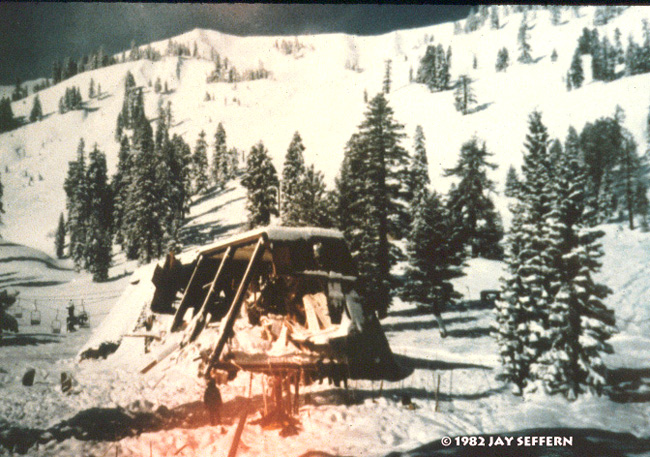|
Tahoe Nugget #60:
1982 Alpine Meadows Avalanche (2 Photos)
March 31, 2006
Tahoe snowfall during March 2006 is now firmly in record territory. Alpine Meadow's ski resort has received 16 feet of snow at its base lodge and 22 feet at mid-mountain since March 1. That is the greatest one
month snowfall on record since they opened 35 years ago. (The ultimate Sierra Nevada monthly snowfall record is still 32.5 feet in January 1911.) This month's numbers may go higher yet as it snowing again today
(Thursday) and we are currently under a Winter Storm Watch with up to 2 more feet expected Friday night. The heaviest snowfall (2" to 3" per hour for 4-6 hours) will probably fall after midnight into the
early hours of April 1, but no matter how you cut it, this March has displayed a hyper-active storm pattern in Northern California.
Our current weather serves as a reminder of one of the most powerful
avalanches in recent times that slammed the Lake Tahoe region on March 31, 1982. I was here for that one and remember it well. The killer slide of '82 is still one of North America's most deadly ski
disasters. At Alpine Meadows, where the base snowpack before the late March storm measured 14 feet in the higher elevations, nearly 90 inches of snow fell in barely four days. Winds in excess of 100 miles per hour
hammered the upper mountain and drifted more snow on top of what fell from the skies. In a desperate attempt to maintain control of the loaded slopes above the resort, Alpine Meadow's ski patrolmen planted up to
100 pounds of dynamite each day at slide prone areas. Unable to reach the higher exposed ridges, avalanche control crews fired projectiles with a 75 mm recoilless rifle located at Gunner's Knob, as well as from a
mobile howitzer mounted on the back of a truck.
Although the lower slopes controlled with hand charges appeared to be producing mini avalanches as expected, the slide activity on the higher and less
accessible ridges were difficult to evaluate because of poor visibility. As a precaution, Alpine closed all its chair lifts Monday, March 29, and then only opened three lower lifts the following day. Alpine Meadows
was not alone in its dilemma, avalanches were occurring on state highways and causing damage to structures at neighboring Squaw Valley. On Wednesday March 31, conditions were so bad that Alpine shut down completely;
only the main lodge remained open.
In the three-story, A-frame Summit Terminal building, Bernie Kingery, Alpine Meadows' mountain manager for the previous 11 years, supervised avalanche control. A seasoned
avalanche expert for 23 years, Kingery had once said that would-be snow slides were "like a stack of marbles ready to go." Suddenly at 3:45 p.m., a catastrophic avalanche broke free from Buttress Slope and Poma
Rocks area, a slope with no known history of destructive slides. A wall of death and destruction 300 yards wide and 14 feet high came crashing down on the resort, destroying the steel-girded Summit Terminal
building, engulfing the 70,000-square-foot main lodge, and sweeping through the parking lot. Seven people were killed.
Employee Anna Conrad and her boyfriend, Frank Yeatman, both 22, were changing clothes in
the second floor ski lift operator's locker room when the walls collapsed, crushing them in snow, ice and debris. Five days later, after relentless searching by more than 100 people, rescue teams found Anna Conrad
curled up in a protected space 2 feet wide, 3 feet high and five feet long, but she was still alive. Anna survived, but lost her right leg below the knee and the toes on her left foot. Now married and living with
her husband, Brent, and their two children in Mammoth Lakes, Calif., she works as a volunteer host at Mammoth Mountain ski resort.
Photo #1: Alpine Meadows main lodge heavily damaged by 1982
avalanche.
Photo #2: Destroyed Summit Chair terminal building where Bernie Kingery died. The day of the avalanche, Kingery had ordered the resort closed to the public for safety and had sent most employees home,
including ski patrol. No doubt he saved many lives. Note person in foreground staring up at damaged structure.


|




